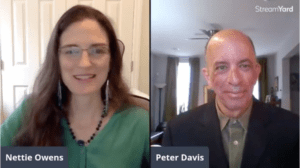
Did you read the title and think, “Yes! Nettie is going to drop some of her Nettie wisdom, and I’m going to get focused and start getting things done”?
But here’s the truth.
I picked this topic about six weeks ago, and I am sitting down to write these notes a week later than I had hoped to. I put it off. I also missed my deadline, set by me, on finishing my book, recording a video message, and writing a new Ketchwords campaign.
The irony is not lost on me.
I have been procrastinating, and now it’s time to talk about it.
Aside from the reality of these missed deadlines and the putting off of tasks I know I need to do, there is also the reality that I am generally good with time and task management. I am not lazy. I am smart, and I aim high.
Another truth? I love to write and communicate! I enjoy sharing my ideas.
I’m probably a lot like you.
I know what I need to do, most of the time, I get it all done, and usually, it’s done well.
So why wait?
How can all of the above be true, and procrastination still exist?
Procrastination But WHY
As Dr. Fuschia Sirois of the University of Sheffield explains in “The Puzzling Psychology of Procrastination and How to Stop It,” we think of our future selves in the same way as we perceive a stranger. In this way, we are disconnected from our present behavior’s effect on our future selves. In addition, people who procrastinate have been found to have more gray matter in the amygdala region of the brain, which controls the fight or flight response. This leads them to be more sensitive to negative outcomes, and thus they are more likely to avoid a situation with a perceived negative result.
It’s a bit of a strange loop that we get ourselves into. We avoid an activity because we perceive it will have a negative effect, yet we are not feeling that effect in the present because it will apply to our future selves, who is yet a stranger.
The trap of, “Just do it!”
So what do you do? Often, I have heard my clients say, “I just need to do it,” – alluding to the procrastinated task. This thinking takes us back to our original question, why do we put off what we know we ought to do?
We know now that there is a disconnect between the present tasks and their effect on our future selves AND a desire to avoid perceived pain. Will “just doing it” solve the problem?
In my experience, it will not.
The challenge here is that we again get stuck in a trap of knowing what to do, berating ourselves for not getting it done, and then also chastising ourselves for our procrastination and not “just doing it.”
One solution is to connect more to our future selves. When I get into a cycle of procrastination, I find the Rearview Vision exercise to be especially helpful.
In this exercise, I imagine myself 30 or more days into the future when the task at hand is complete, and I am experiencing the outcome of having it done. The bonus is that by stepping out of my current reality, I can often create solutions to complete the task.
And research backs this method up. A 2016 study published in Applied Psychology found that students who envisioned their future selves for 10 minutes twice a week were less likely to procrastinate.
When it’s not procrastination but another “p” word
Another reason for procrastination is that sometimes we truly just have too much on our task list, and it isn’t possible to get it all done.
In this case, it isn’t procrastination but prioritization.
When this is the case, it often comes down to us taking a look at our task list and deciding what’s urgent versus what’s important – especially if you tend to think that everything is urgent AND important. If you use the Eisenhower Matrix to help you prioritize, then you know that “Urgent and Important” tasks need to be handled NOW. If a task falls into the other three categories of the matrix, then you can delegate it, schedule a time to do it, or eliminate it.
If you find yourself procrastinating – and we all do at some point or another – I encourage you to do two things: Taking a few moments connecting with your future self and experiencing the outcome of having the task complete and prioritizing your task list.
You will be amazed at how those two things can be the difference makers.
And now I’m going to go follow my own advice.
Please comment below. I would love to hear from you.
-Nettie














No comments yet.